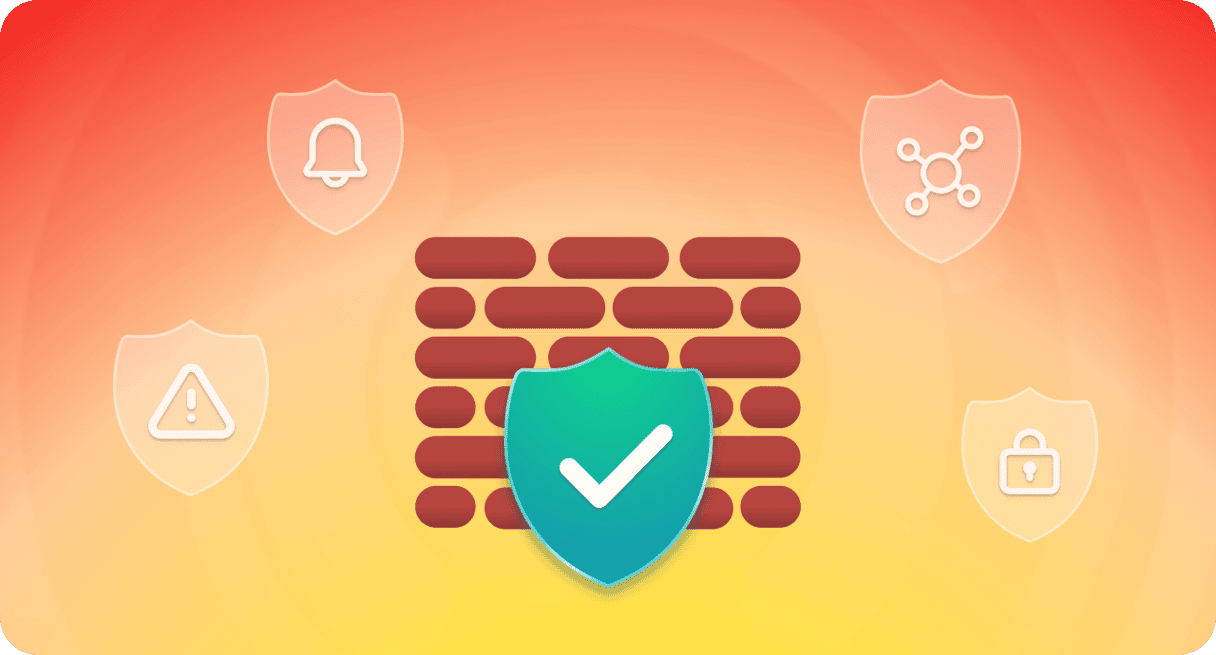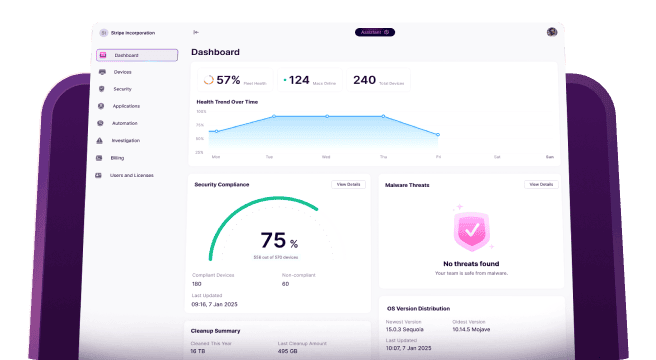As you’re looking for ways to improve your company’s security, remember that firewalls are a vital component. Without firewalls, it’s almost impossible to ensure that your network will be protected. It acts as a barrier between your internal network and any external threats. So, not only do firewalls protect the end-user computers on your network, but they also protect servers and other systems from data breaches.
In this article, I want to dive into the role of firewalls in your environment and help you understand how they work. You’ll also read about the different types of firewalls that are available for Macs. And don’t worry; I know that one of the most likely reasons you came to this article was to find out the best firewalls for small businesses. I’ll cover that and more, too. So, keep reading!
What are firewalls?
Firewalls are security devices or software aimed at monitoring and controlling all incoming and outgoing network traffic on the basis of predetermined security rules. The best way to explain what are firewalls is to think of them as walls between internal networks (trusted ones) and external networks (untrusted ones), such as the internet. Firewalls are a fundamental component of any network security strategy and help protect sensitive information and resources from unauthorized access, malware, and other cyber threats.
How firewalls work
Firewalls work by inspecting data packets entering or leaving the network and deciding whether to allow or block them based on a set of predefined rules. These rules take into account such factors as the source and destination IP addresses, port numbers, and protocols used by the packets.
By examining this information, firewalls can determine if the traffic is legitimate or potentially harmful, allowing only authorized traffic to pass through while keeping malicious traffic out.

Importance of firewalls in information security
While a firewall’s main priority is to protect your network, there are a ton of other great reasons to use one in your environment. Here are just a few benefits:
Protection from unauthorized access
By filtering incoming and outgoing traffic, firewalls help prevent unauthorized users from accessing your network and sensitive data.
Defend against malware
Firewalls block IP addresses and domains that it knows are malicious. Protecting your network in the event one of your users downloads something that’s infected.
Network segmentation
You can use firewalls to segment your network. This will help you limit who has access to certain information. That way, if there is a data breach, it’s limited to just the zone that has been breached.
Monitoring and logging
Monitoring your network traffic is a huge component of security. You can set your firewall up to log the traffic, which can be used for auditing or troubleshooting later.
Types of firewalls for Macs
Even though Macs are typically viewed as fairly secure devices, they can still benefit from being behind a firewall. Here are a few different types you can look into including in your security policies:
- Packet-filtering firewalls: This type examines individual packets based on things like the source and destination IP addresses, port numbers, and protocols. The default Application Firewall that comes with macOS is a packet-filtering firewall.
- Proxy firewalls: This is the type of firewall that acts as a middleman between your Mac and the internet. It inspects and filters all incoming and outgoing traffic.
- Next-generation firewalls (NGFWs): These combine traditional firewall functionality with advanced features like intrusion prevention and application control.
- Unified threat management (UTM) devices: This includes all-in-one security appliances that have firewall features along with other security tools, such as antivirus and content filtering.
Stateless vs. stateful firewalls
If you’ve been researching firewalls, then you’ve probably heard the terms “stateless” and “stateful” being thrown around. Let’s take a look at how they differ and filter your network traffic.
Stateless firewalls
Stateless firewalls will review and evaluate each data packet that is transferred on your network individually. But they do so without taking into consideration any of the context that is coming in within a broader data stream. These types of firewalls rely entirely on predefined rules to decide whether to block a packet or not. Obviously, a stateless firewall is going to be more stringent, but that doesn’t necessarily make it more secure.
Stateful firewalls
On the other end are stateful firewalls. They keep a record of active connections and review packets within the larger context that they’re being transferred in. This helps the firewall make more informed decisions. And you’re likely to have fewer safe packets blocked.
Stateful firewalls generally offer more robust security compared to stateless firewalls, as they can detect and block malicious traffic that may exploit vulnerabilities in established connections. However, stateful firewalls can be more resource-intensive and may require more processing power, which will impact network performance.
Comparing stateless and stateful firewalls
When you’re trying to decide which type of firewall will work best for your environment, it’s important to consider these differences between stateless and stateful firewalls:
- Security: Stateful firewalls monitor and examine the state of connections, providing better protection and making them more robust.
- Performance: Stateless firewalls generally have lower processing overhead, which can result in better network performance.
- Complexity: Stateful firewalls can be more complex to configure and manage if you don’t already have someone on your team who is familiar with them.
- Scalability: Stateless firewalls may be more scalable in some situations, as they do not need to maintain records of active connections.
Obviously, there is no simple answer to which type of firewall is best. But the needs of your business should help drive the decision, especially if there are any specific security needs or a lack of available resources.
Best firewalls for small businesses
When choosing a firewall for a small business, it’s essential to consider such factors as ease of use, scalability, and features. Some of the best firewalls for small businesses include:
Fortinet FortiGate
Fortinet is highly regarded in enterprise security, and they’ve found a way to package it up for small businesses. With FortiGate’s next-gen firewalls, you can get all of the robust tools that Fortinet offers but in a more user-friendly package.
Learn more about Fortinet FortiGate.
Cisco Meraki MX
If you’re looking for something that is cloud-managed, then look no further than Cisco Meraki MX firewalls. Since it is a cloud management platform, the Meraki MX firewalls are incredibly easy to deploy and manage remotely. Plus, you get all of the security and malware protection you’d expect a brand like Cisco to provide.
Learn more about Cisco Meraki MX.
Sophos XG
Of the firewalls mentioned in this article, Sophos XG is arguably the most user-friendly interface. They know that small businesses probably don’t have the same knowledge or experience a larger IT team might have. That’s why Sophos XG has packaged the Sophos security features in a more digestible way. Also, this firewall can be fully integrated with other Sophos security products you may already be using in your environment.
Learn more about Sophos XG.
Firewalls are an essential part of an IT security infrastructure. They can protect your network from threats and cyber attacks. As someone that likely works in IT and tech, you understand that this is not something you should skimp on. But the question is how do you convince the higher-ups and stakeholders at your company that this isn’t just more “computer equipment”?
Having a strong understanding of the different types of firewalls and their capabilities is a great start to do that. Because if you know the unique benefits of each firewall, then you can explain them in a way that actually adds value to your business.









